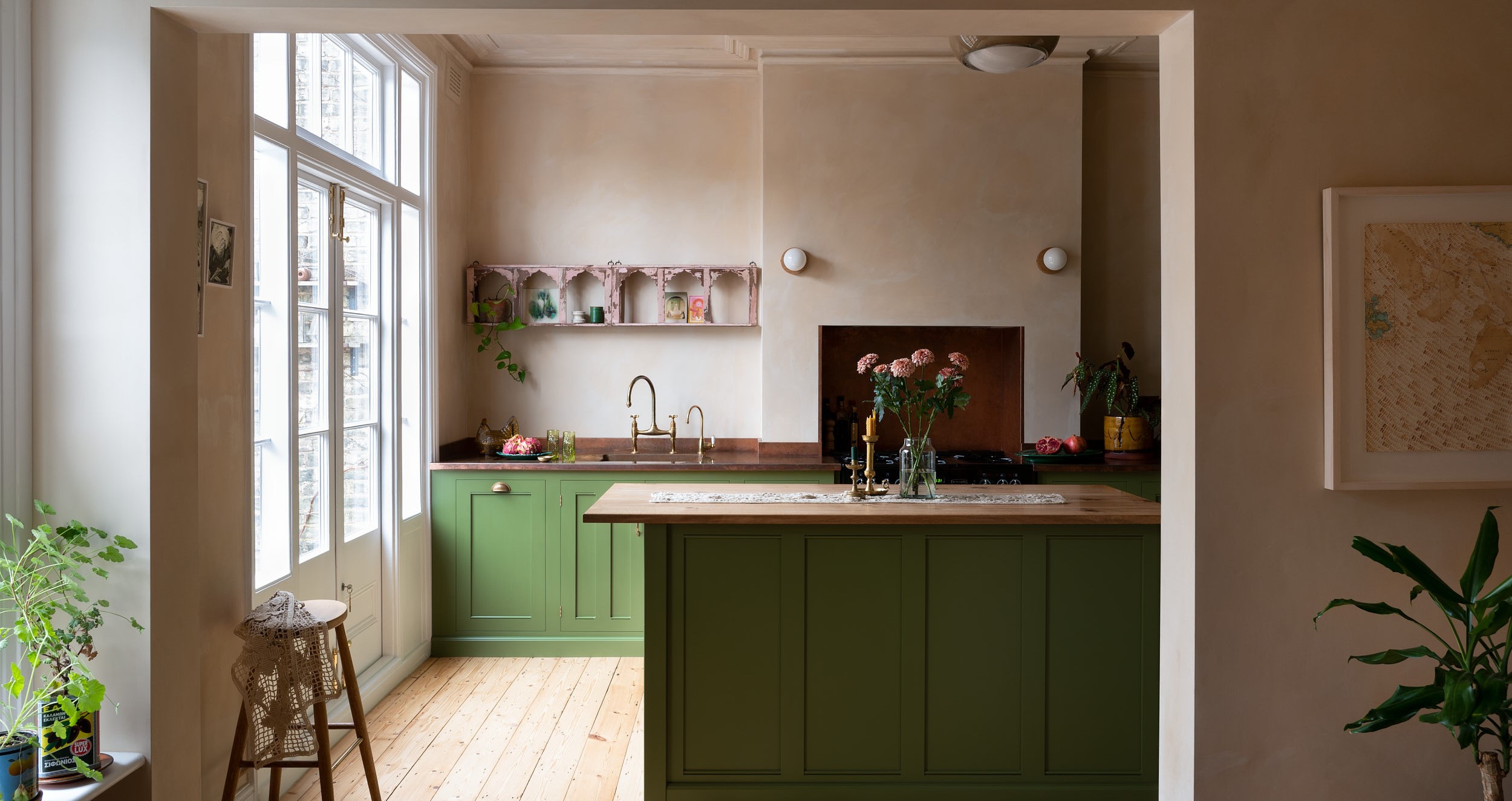
The right kitchen countertop material matters, not just because it is the most practical, hardworking element in the kitchen but also because, as the largest surface in the room, its look adds to the room's aesthetics. This investment is supposed to last decades, so it's important to choose a material that is beautiful, durable, and easy to maintain.
If you're unsure which kitchen countertop would best suit your space — here are 11 expert-recommended options.
1. Veined Granite
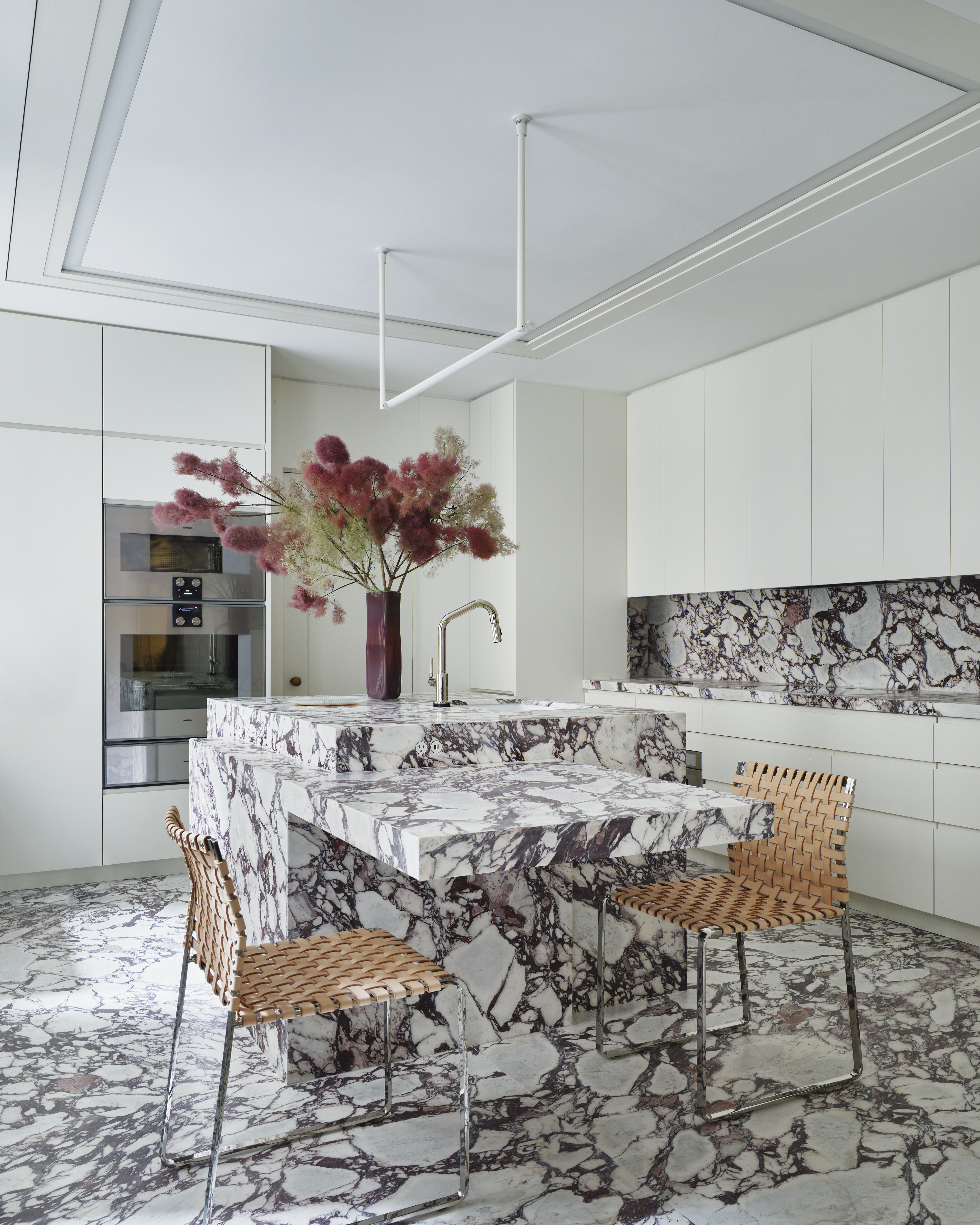
Luxe, eye-catching materials that guarantee practicality are a modern kitchen's cornerstones. Granite is known to be hard-wearing, and long-lasting; however, thinner stone could crack or chip if you drop something on it. In terms of colors, granite doesn't have a very wide range but is usually available in neutral colors such as white, beige, and gray which work in most kitchens. And, it's the classic white granite, like Kashmir White or Colonial White, that tends to sell the most.
What gives this stone uniqueness is the veining that adds depth and character to the space.
"We chose granite for the countertops, as it outperforms marble in durability," shares interior designer Clive Lonstein. "However, I have to admit that marble has a certain elegance that’s hard to resist. The intricate patterns in the stone help mask stains, making it a sensible choice for busy kitchens while still providing a cohesive look across the surfaces."
Usually, the cost of granite and quartz are comparable; the former costs anywhere between $40 and $60 per square foot, on average, which also includes granite type, installation, labor, and other factors; while quartz, sold in 120" x 55" slabs cost between $50 to $200 per square foot, inclusive of material and labor.
2. Wood
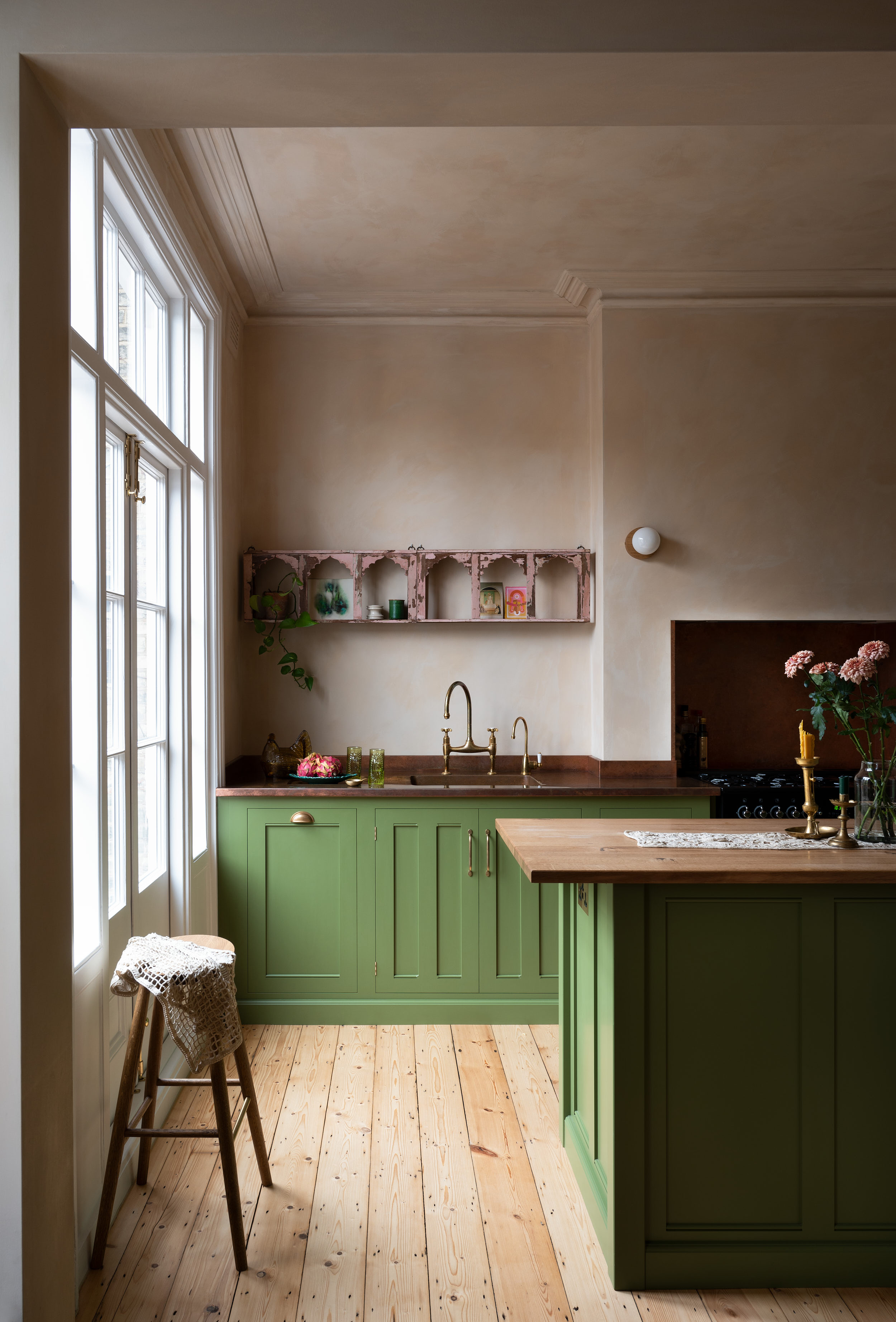
Have you ever wondered if a butcher block countertop is durable? The answer is a resounding yes! This classic kitchen material is available in a wide variety of styles and stains and offers a furniture-like finish. These counters can last for decades and have similar strength and durability as that of natural stones like granite. However, wooden counters do require monthly resealing to have a long lifespan.
"Wood is a beautiful option, tactile and strong, and each piece is different so it seems to have a character which always makes a room feel more honest," says Helen Parker, creative director of deVOL. "Wood needs care, however; it needs feeding to keep it supple and strong. It needs to be kept dry and oiled once in a while."
"We have seen an increase in all wooden countertops over the last few years — something we are very happy about, as mixing wood and stone is a very traditional look in freestanding kitchens," adds Helen. "Wood is beautifully tactile and naturally warmer to the touch than stone so it offers a more relaxed and gentle approach to your worktops and makes a perfect material for kitchens. Especially ones that blend into living areas, as it feels less utilitarian."
In terms of costs, in a typical 100 to 200-square-foot kitchen, a wooden countertop would cost $1,500 to $6,000 (including labor and materials).
3. Green marble
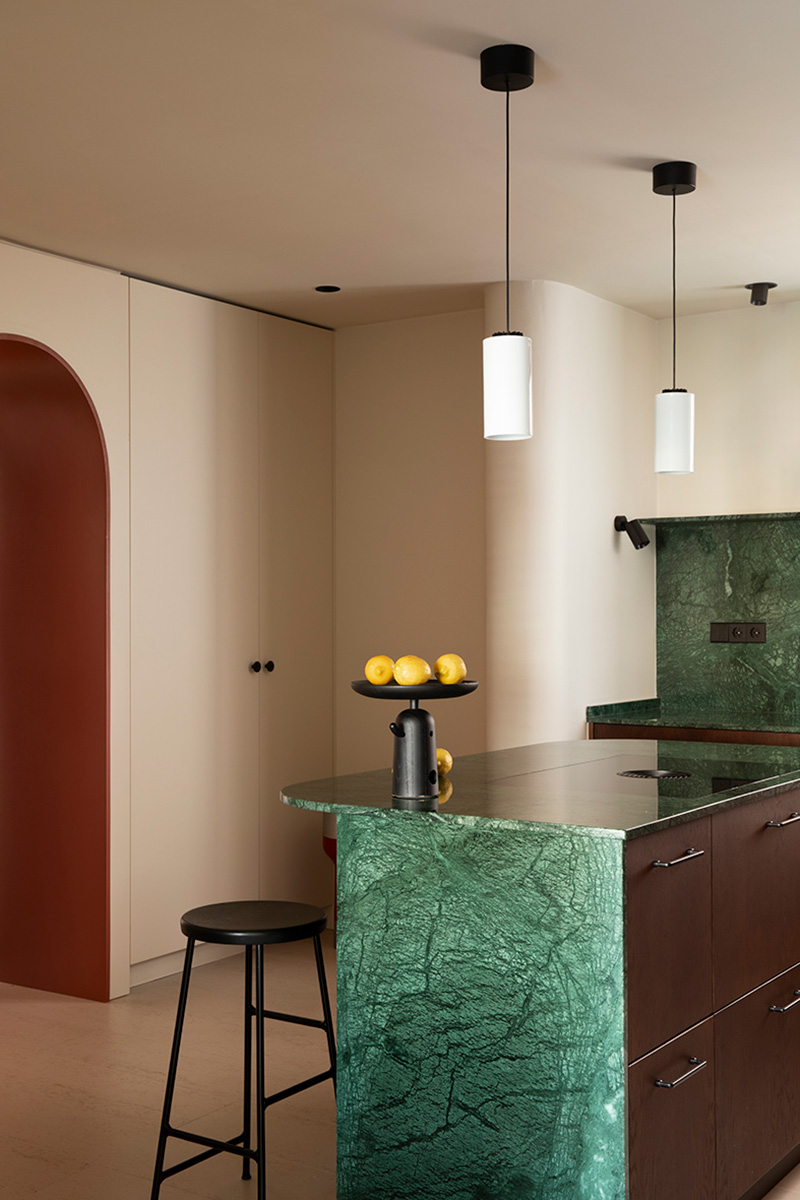
There's nothing more classic than a marble kitchen. This luxury stone is popular in high-end homes and is soft and smooth to the touch. Marble is a strong material and doesn't break easily, however, it does require extra care and maintenance. It can get stained easily which is why it needs to be sealed often.
In terms of marble colors, there are a few you can choose from. Apart from green, you could also go in for pink, soft white, gray, cream, beige, or black. In super busy kitchens, it's best to go for colored marble as it can hide the stains better.
"This countertop is made in Indian Green Marble," says Carlos Tomás, founder of Estudio Recente. "The intense color of the countertop makes a perfect match with other materials and shades such as dark wood and general beige tones."
For the most basic marble, the slabs would cost between $40 to $60 per square foot (including material and labor). For a mid-range marble, the prices vary between $60 to $100 per square foot. And for a high-end one, the cost could be $100 to $200 per square foot or more. However, these prices may vary based on market conditions and do not include installation costs.
4. Solid surface
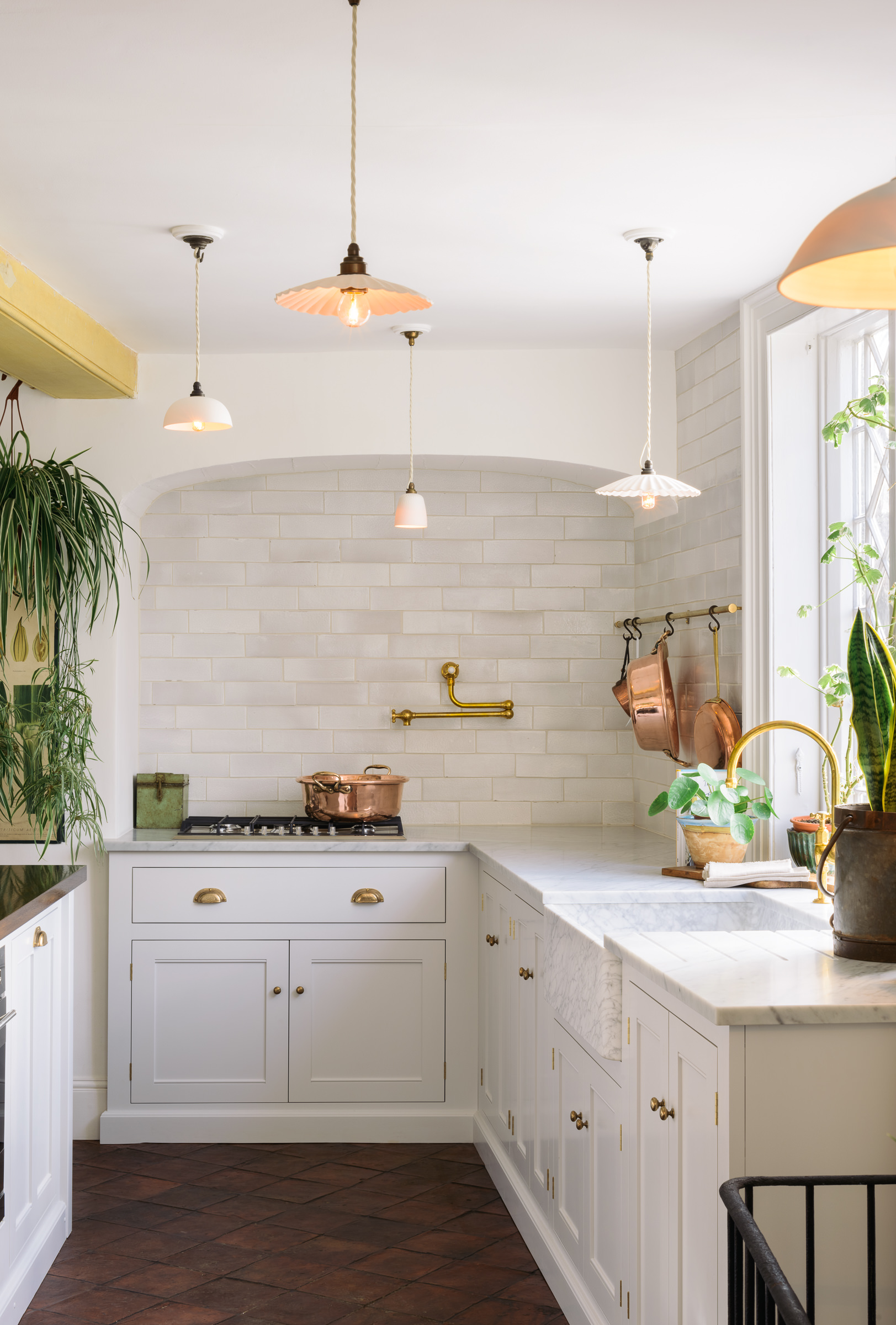
A practical kitchen countertop material is solid surface, which is designed to look like granite or other natural stones. This synthetic material, held together with resins, is easy to clean and maintain and is natural and non-porous. While it can get scratched over time, it can be buffed out with sandpaper. It is available in several colors, like ochre, gray pink, black, white, beige, and brown. Plus you can customize it as per your tastes and preferences.
In terms of costs, solid surface countertops are between $1,500 to $9,000 ($50 to $150 per square foot), averaging at $3,000. This is inclusive of materials and labor, but not installation.
5. White marble
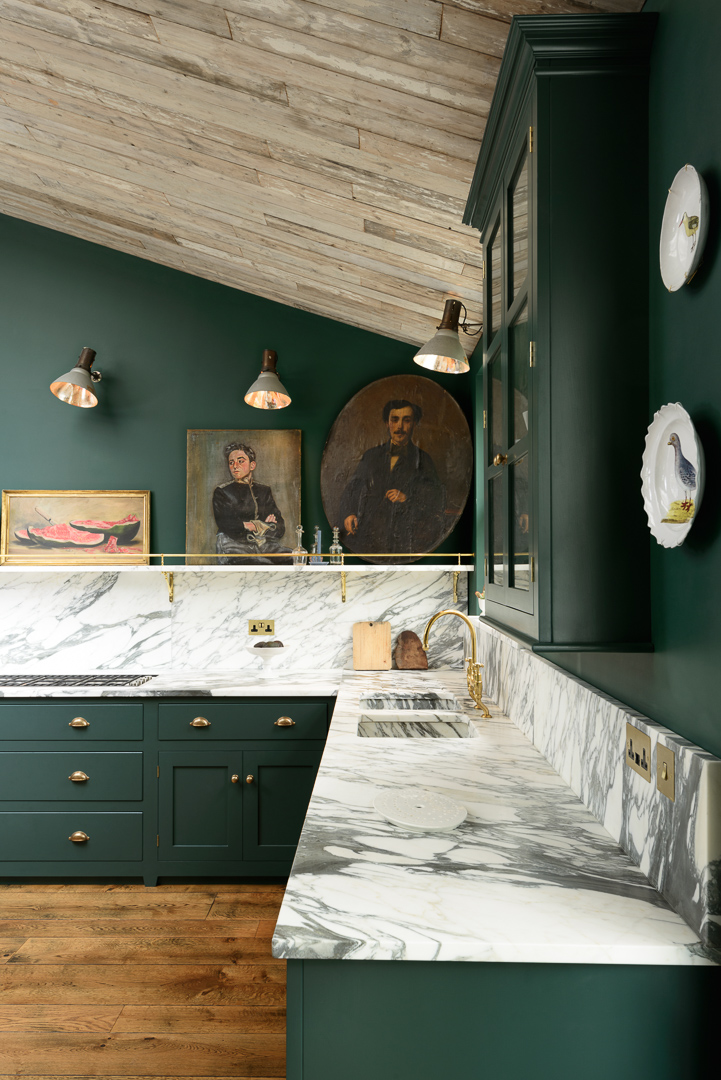
If you're renovating a kitchen and want to give it a classic, timeless quality, there's nothing better than a white marble countertop.
"Marble countertops offer drama and sophistication to a kitchen," says Richard Atkins, managing director of DesignSpace London.
His top tips for installing it? "If a large area is required to be clad in this material, consider using book-matched slabs to create a powerful and dramatic effect," he explains, adding: "It is advisable to design your marble kitchen with consideration of slab sizes to avoid unsightly joints. An oversight on this detail could ruin the look and may take away the effect and grace that these materials can bring to a kitchen scheme."
Magnus Nilsson, lead designer at Blakes London, agrees white marble is a go-to kitchen countertop material for a glamorous finish.
"Marble is beautiful; it’s a natural material, so every single piece of marble is unique," he says. "You can’t replicate what nature can create, so a natural piece of marble will add an organic flavor to the room."
However, he also advises remembering that it is a porous material that might not work too well with a very busy family. "It does tend to stain more easily than some of the manmade alternatives, especially with things like lemon juice, fruit, spices, and red wine."
6. Quartz
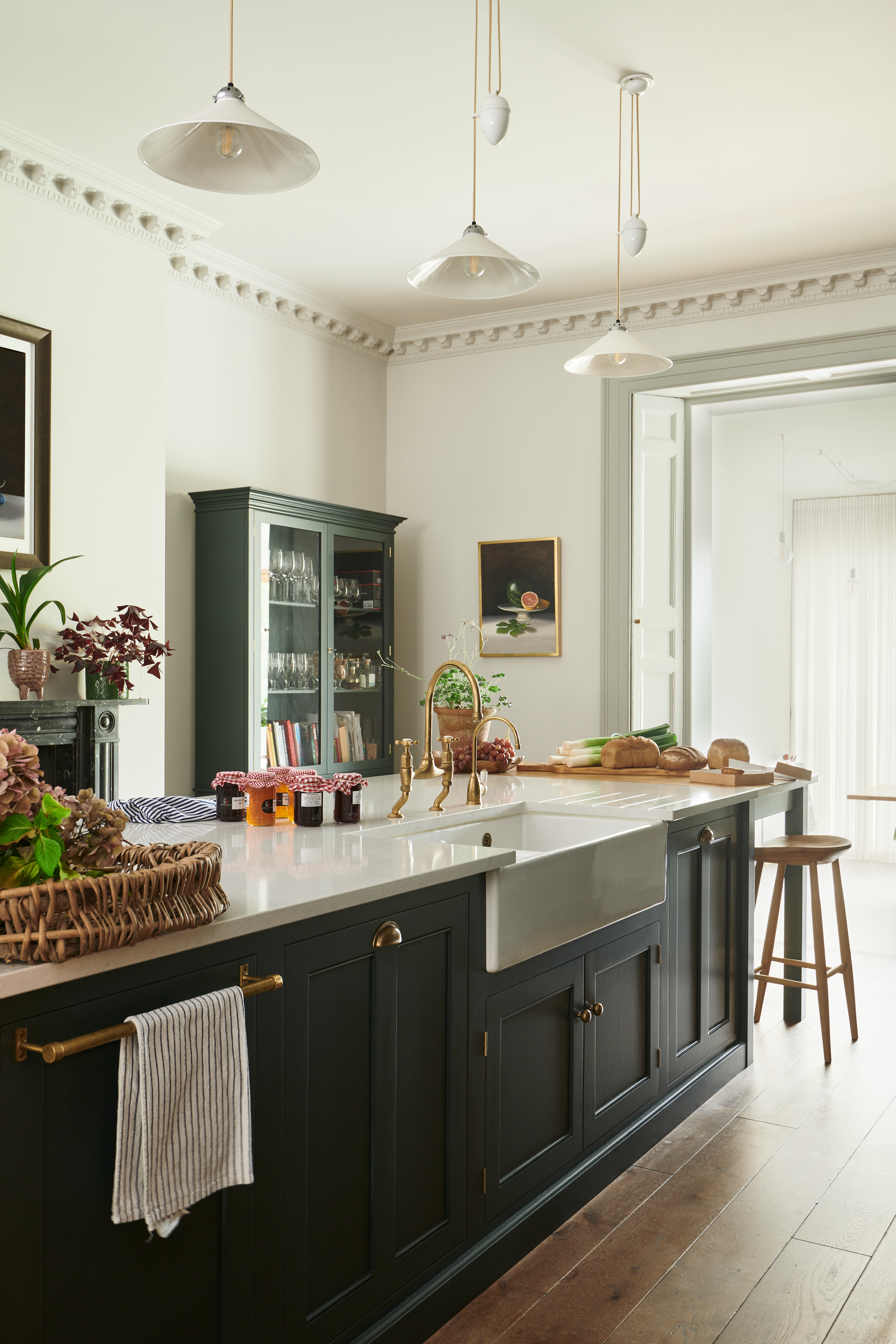
Amongst the countertops that last the longest is quartz — a manmade composite that is extremely popular owing to its mix of pleasing aesthetic and durability. "Quartz is currently one of the most popular countertop materials for kitchen use," says Richard. "Up until recently, the graining has been less exciting than the dramatic veins found in natural materials like marble or granite — however, as the trend is leaning towards natural-looking work surfaces, many companies have introduced new finishes to meet the market's need." It is also available in several pleasing tones like sand, white, black, beige, brown, and cream.
"This is great news for anyone who wants a stain, heat, and scratch-resistant counter that also delivers personality," adds Richard. "Many manufacturers offer quartz work surfaces with similar properties, however, they tend to have their own colors and finishes so it is worth researching before choosing a brand."
"Some quartz manufacturers offer counters with bacteriostatic protection," says Richard. "This active hygiene system prevents the growth of bacteria, which is perfect for busy family kitchens."
A few things to keep in mind about quartz, however, is that it can discolor or crack under very high temperatures. Also, a quartz counter is heavy, so the installation and labor costs for this are higher. It is often sold in 120" x 55" slabs, and costs between $50 to $200 per square foot, averaging at $70 to $100 per square foot, all inclusive of material and labor, minus installation.
7. Stainless steel
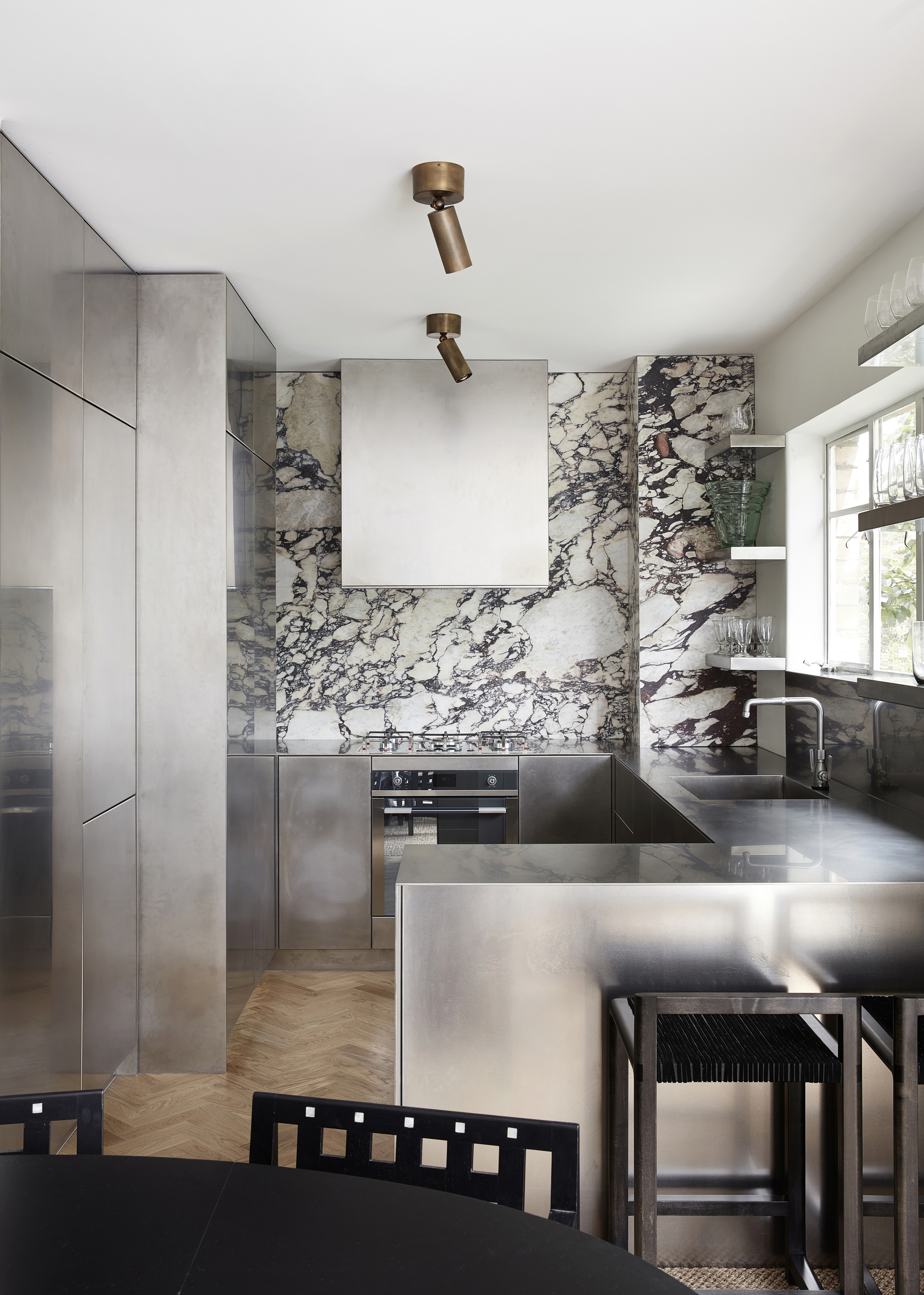
Stainless steel kitchens have caught the eye of designers and homeowners recently, and this material, especially used on the countertop, can have several benefits. It needs the least maintenance, and while best known for professional kitchens, has become a trend for residential industrial kitchen glamor in its own right.
"Stainless steel surfaces scratch easily but, over time, they develop a wonderful patina," Richard explains. "They can also offer a clean-lined look as counter thickness as thin as 4mm can be achieved with stainless steel."
Blake London's Magnus Nilsson agrees it is a "very practical surface", in terms of trying to keep it clean. He adds: "It’s easily scratched but doesn’t stain, and is very hygienic. It needs to be constantly buffed and polished due to the marks, but it can look very cool in a modern home."
The cost of this material varies. On average, it can cost about $3,000 for 30 square feet of counter space ($70 to $160 per square foot), including materials and professional labor. However, it could go up to $4,800 for metal countertops while the prefab ones are cheaper, at $2,100.
8. Copper
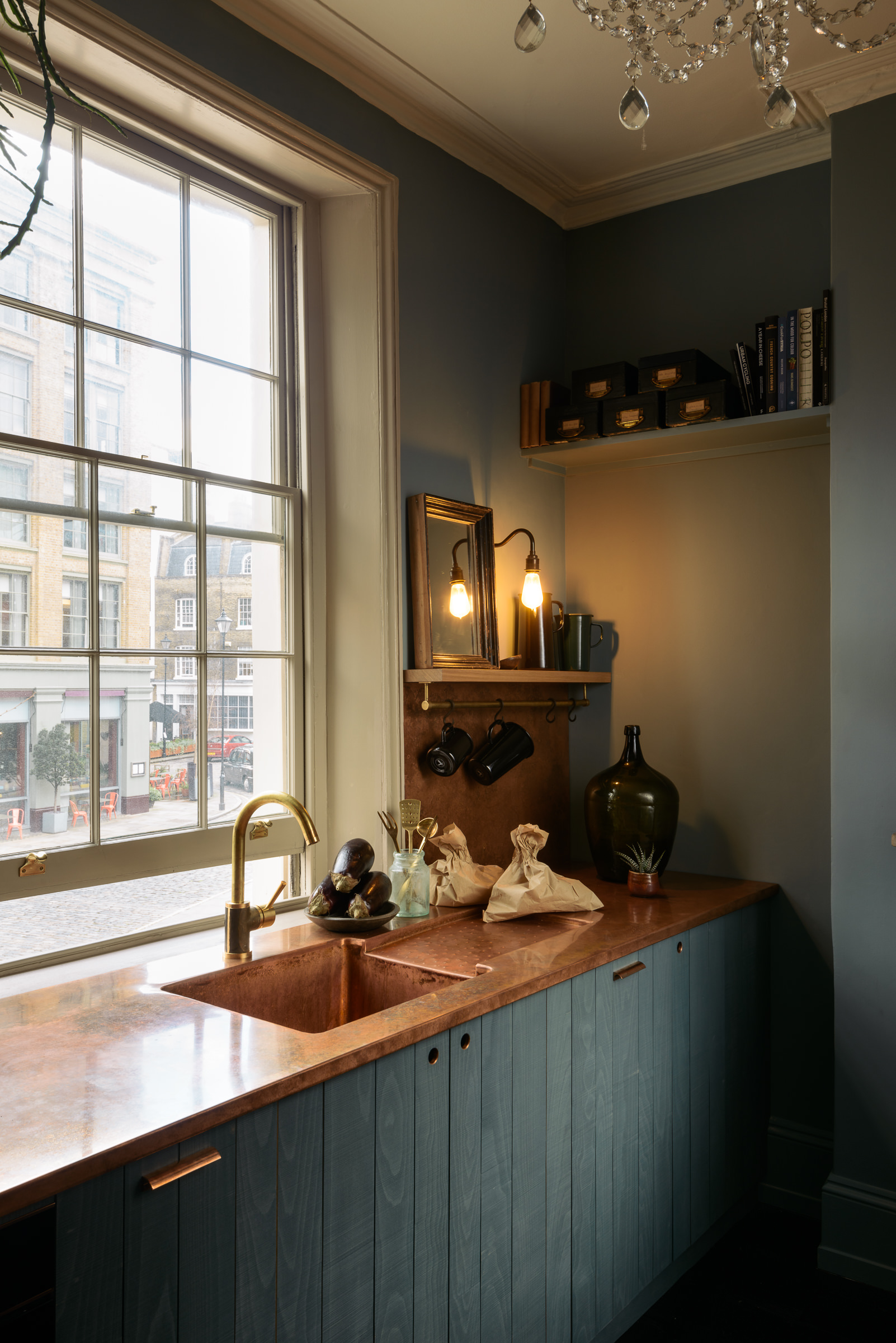
Planning a kitchen that instantly appeals? Think of one with a copper countertop. This material is shooting up the popularity scale thanks to its glamorous yet durable appeal.
"We love using copper countertops, and they're becoming increasingly popular," says Helen Parker of deVOL. "Copper has a long history of being used for counters and has amazing inherent antibacterial properties."
Copper has a few limitations, however. "We do not recommend food preparation directly on copper as it can taint the taste of food," Helen says. "We also recommend that you don’t cut directly onto copper as it is soft and will scratch."
Copper countertops are priced at $100 to $175 per square foot, and usually have a $10 to $30 per square foot extra cost attached due to labor. Note, if you have existing countertop, and decide to remove it and install copper countertops, you’ll likely pay an additional $50 to $300.
9. Porcelain
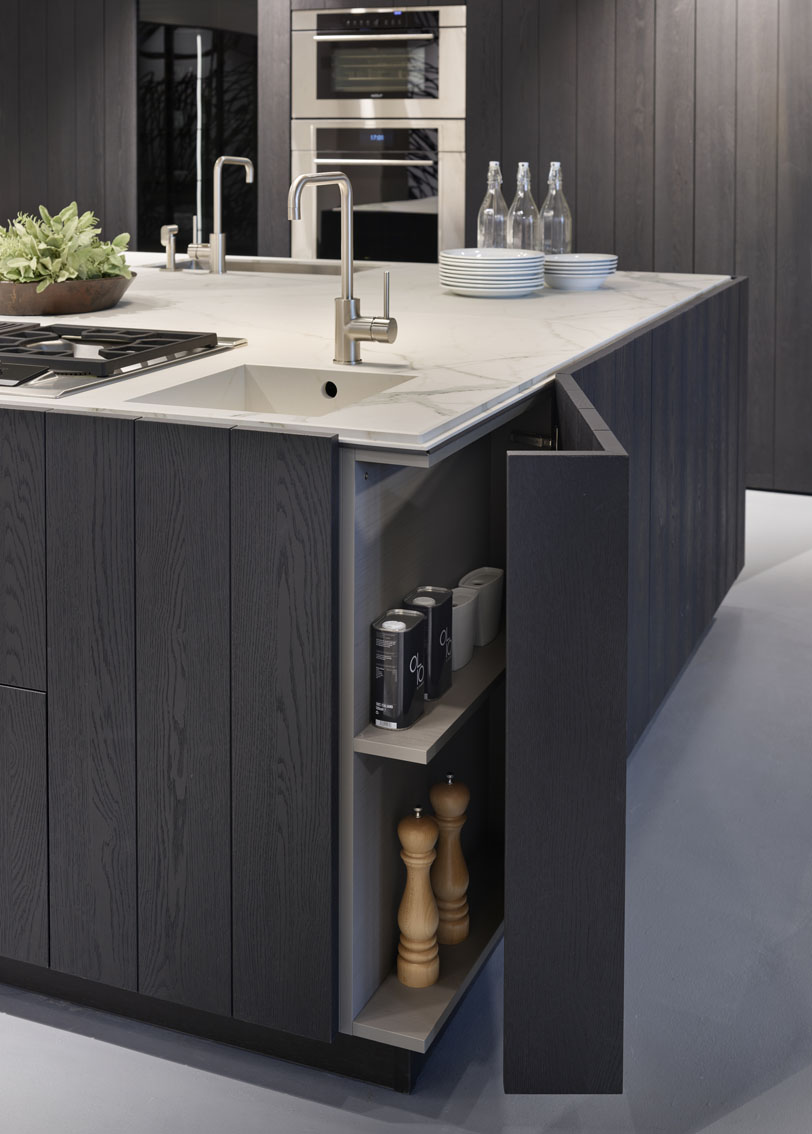
Porcelain has always been a big countertop trend, as it's an affordable, stable, and highly durable material. This counter is available in several tones like cream, gray, brown to light green, yellow, charcoal, black, and light gray.
"Kitchen manufacturers like Modulnova have applied porcelain not only as countertops but also on kitchen doors," says Richard. "Finishes and effects available include stone, wood, and metal."
"The option of having kitchen work surfaces that look like they've been carved out of stone is now easier to achieve," he adds. What sets this material apart is its resistance to heat, its durability, and the fact that it can imitate natural stone. The downside? It can crack under high pressure and its scratches are highly visible.
In terms of price, there are two types of porcelain countertops and their costs vary. Porcelain tiles are about $2 to $30 per square foot, while porcelain slabs cost $20 to $65 per square foot. While the material costs aren't that different, it's the installation that bumps up the price.
10. Concrete or microcement
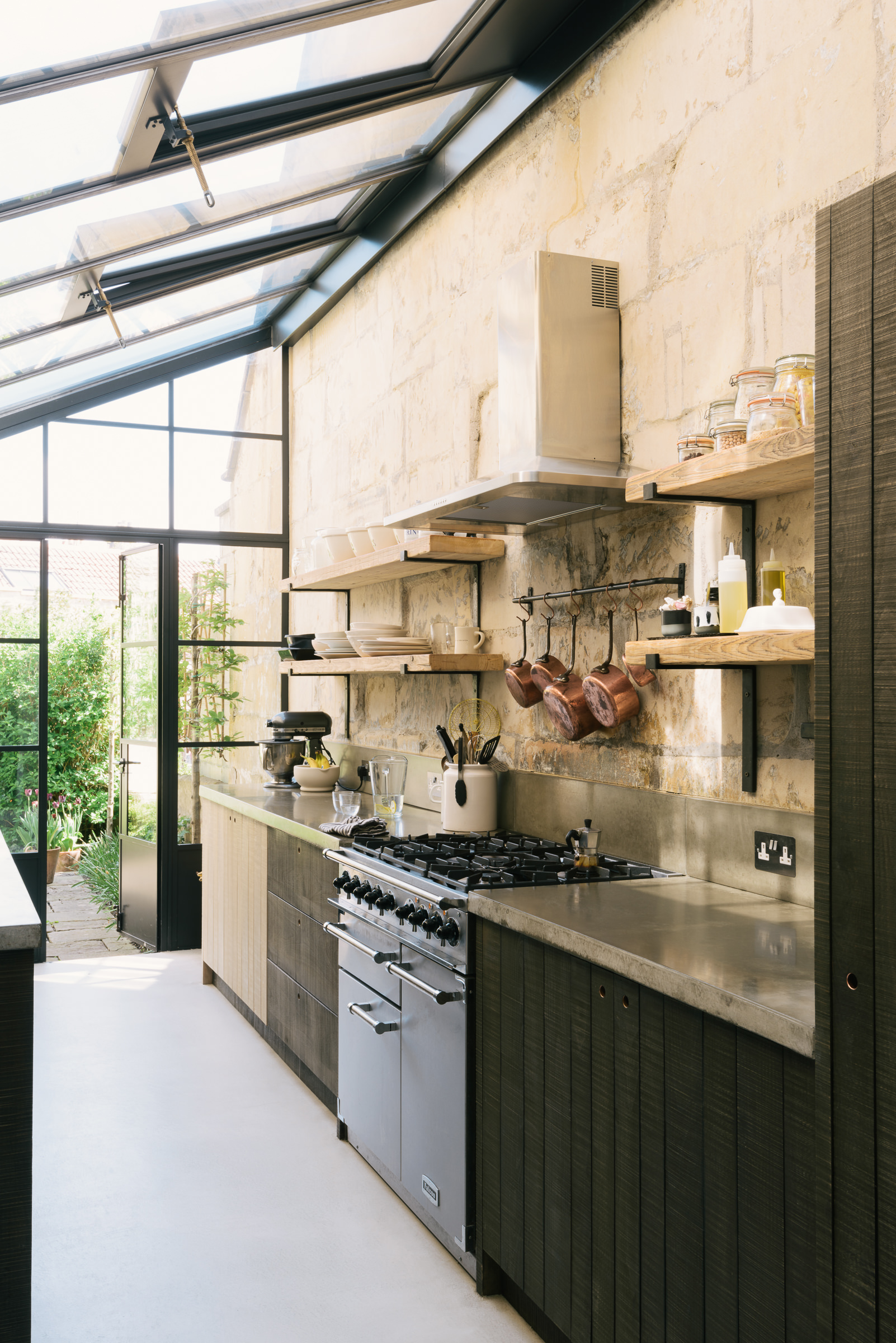
While it is pretty common to see concrete as kitchen flooring, it might come as a surprise to see this material on countertops. Concrete is very aesthetically on-trend, and is durable, although it does have drawbacks, including its eco credentials, or lack thereof.
"Concrete is expensive, and not the most eco-friendly product to use," says Magnus Nilsson of Blakes London. "However, it's very hardwearing, trendy, and does tend to be a countertop for life. It’s also ideal for an industrial-style decor theme."
The price of concrete counters varies. The most basic ones are priced between $65 and $100 per square foot, including material and labor. A mid-range quality concrete will be between $100 to $135 per square foot and that includes integral or seeded aggregates, custom or decorative shapes and edges. And finally, the high-end concrete counters can cost $135 and more per square foot.
11. Laminates
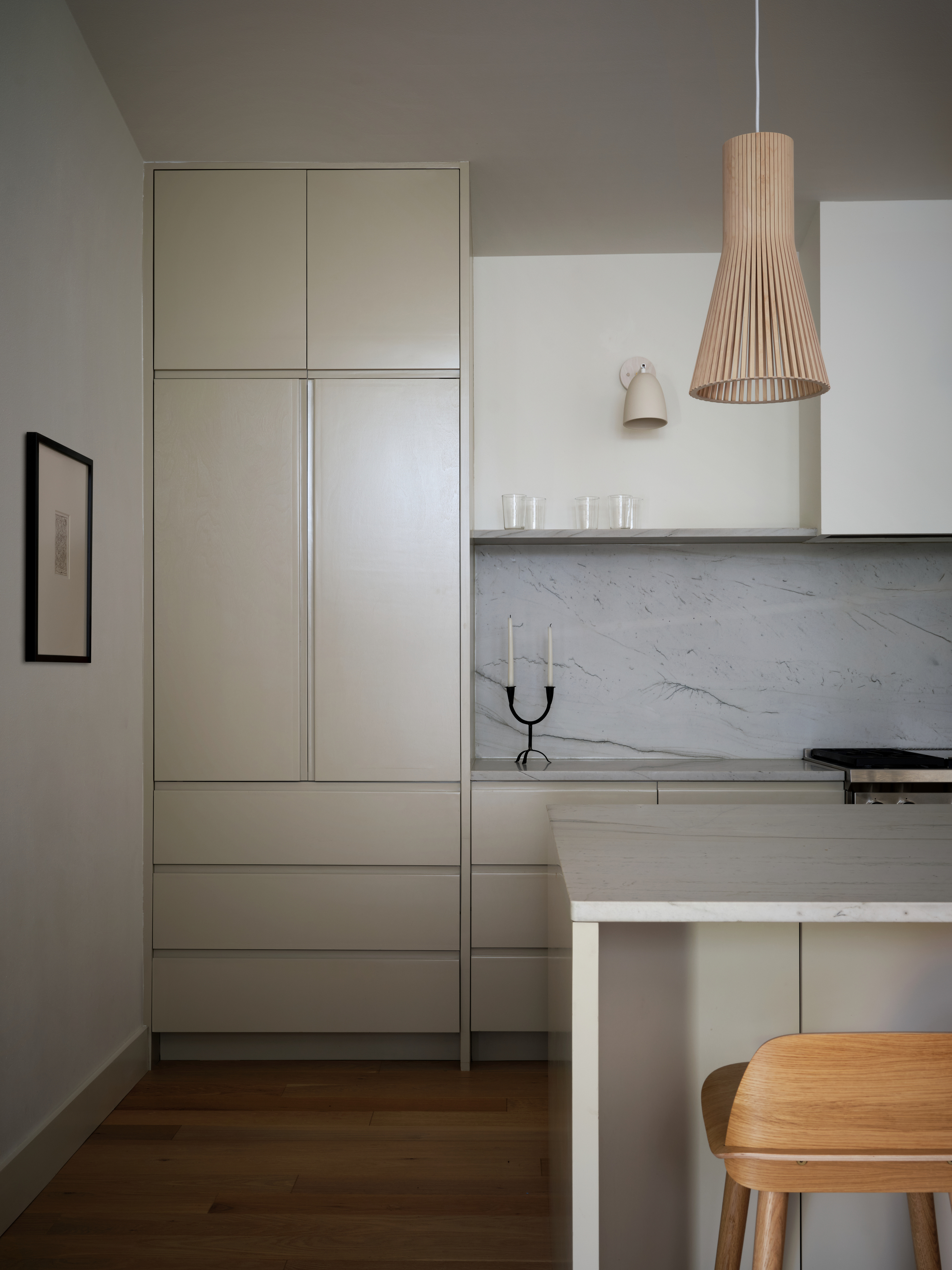
The only form of counter that does not require templating is laminate, as it can be cut to size on-site. It's budget-friendly and especially works in more practical spaces like apartment kitchens. One thing that sets this countertop apart from others is that you can paint it; this is also an affordable and creative way to update your kitchen without the disruption of a renovation. You can also buy laminates in several tones like white, blue, black, gray, rose, or green.
"Laminates come in different finishes and qualities," says Richard. "Traditional laminates often look and feel like plastic, however, there are many more fine, matt, and more realistic-looking laminates that have been introduced in recent years. This allows homeowners to have a sophisticated, creative yet durable scheme for their kitchen, even if they are on a tight budget."
However, he warns that you have to be careful with your choice, adding: "Avoid poor quality laminate finishes that imitate natural stones or wood, as the effect is often unrealistic and could age the look of a kitchen." Plus, the thinner variety is vulnerable to heat damage and scratches easily.
In terms of price, this is a budget option. On average, laminate countertops can cost between $10 to $50 per square foot. And, it can cost between $20 to $80 per square foot to install it, including the price of labor.
What is the most sturdy material for kitchen countertops?
Kitchen design is a careful balance between what’s going to look good and what’s going to work well. "If you go for a countertop that’s low maintenance, doesn’t need sealing (because it isn’t porous like most natural stones), can take spills and knocks without causing sheer panic, then quartz surfaces should be your best bet," says Claire Birkbeck of Neptune. "Also, the most sturdy kitchen countertop tends to be manmade, composite materials, such as quartz and Corian."
Quartz, a mix of natural and manmade products, can mimic the look of marble but is scratch-resistant, ultra-durable, easy to clean, and hygienic thanks to its non-porous finish that makes it resistant to bacteria.
What is the cheapest kitchen countertop material?
Counters are a defining feature of any kitchen, and will likely require you to consider the matter of function or form first. The aim, of course, is to achieve both.
"When working to a budget, granite is the perfect combination," says Claire."It’s a tough rock that’s forged in fire, so very hard to damage (and if you do manage to, it’s generally easy to repair, unlike marble or timber). "
"It also has a beautiful dappled effect that will mask any stains," avers Claire. "The reason we recommend this surface for projects on a budget? The material itself is much more readily available, so the cost isn’t nearly as high as quartz, timber, or marble."
Magnus Nilsson agrees, adding: "Granite tends to be quite a hardwearing, relatively stain-free option that can come in at quite a cost-effective price point."
What is the most popular countertop for kitchens?
"The most popular kitchen countertop material is, undoubtedly, marble," says Claire. "Whether it’s a pale grey vein or a dark and dramatic one, marble brings a sense of calm to kitchens. And not only does marble's good looks win over the crowd but, like oak, it brings with it an inherent sense of luxury. A bonus? It remains cool to the touch, making it the material of choice for any budding pastry chefs out there."
"Marble is by far the most coveted countertop material," agrees Blake London's Magnus Nilsson. "While it is trickier to maintain and look after, it always adds beauty and elegance to a room. While marble isn’t always the most practical solution, man-made options that are made to look like marble, like Silestone and quartz, also work incredibly well."






